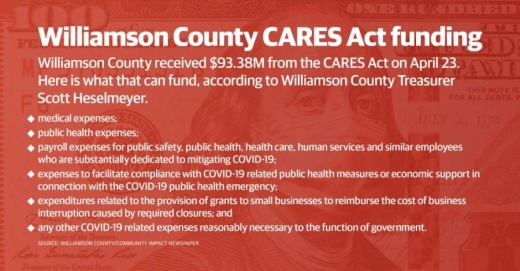Williamson County received $93.38 million from the CARES Act on April 23, Williamson County Judge Bill Gravell told the commissioner court during an April 28 meeting.
The CARES Act established the $150 billion Coronavirus Relief Fund, which will be used to assist states and local governments impacted by the COVID-19 pandemic.
“Initially, I would tell you that I was shocked with the amount because I thought that it was exorbitant, but then I began to look at the parameters and how we could use it and I realized that if we use the money well ... it is an opportunity to get reimbursements for the feeding of senior adults in our community, and it could be a great opportunity to help our local businesses,” Gravell said.
Payments from the fund can only be used to cover costs that are necessary expenditures incurred due to the public health emergency with respect to the coronavirus; were not accounted for in the budget most recently approved as of March 27; and were incurred during the period that begins March 1 and ends Dec. 30, Williamson County Treasurer Scott Heselmeyer said.
“That is all that the legislation sets, and so that leaves a whole lot of open territory,” Heselmeyer said.
The funding can go toward medical expenses; public health expenses; payroll expenses for public safety, public health, health care, human services and similar employees who are substantially dedicated to mitigating COVID-19; expenses to facilitate compliance with COVID-19 related public health measures or economic support in connection with the COVID-19 public health emergency; expenditures related to the provision of grants to small businesses to reimburse the cost of business interruption caused by required closures; and any other COVID-19 related expenses reasonably necessary to the function of government, Heselmeyer said.
There are some clarifications that still need to be made on how the money will be dispersed and what the qualifications will be, particularly to local businesses, he added.
To address that concern, the court appointed a strike team for distribution of funding for businesses led by Heselmeyer, Precinct 3 Commissioner Valerie Covey and Precinct 4 Commissioner Russ Boles. The Commissioners Court will hold a special meeting on May 1 at 1 p.m. in order to further discuss business funding.
The strike team will also be responsible for determining if the money can be distributed to local governments, cities and school districts.
“To me, the first priority would be to [fund] the small businesses because, from my perspective, if the businesses are working well, the taxing agencies will work well,” Covey said.
Gravell said he would like checks to small businesses distributed as soon as possible, once parameters are set by the strike team.





